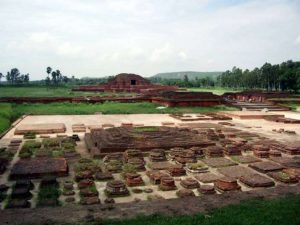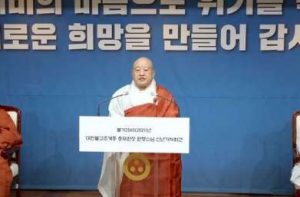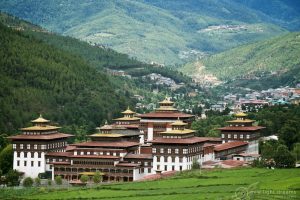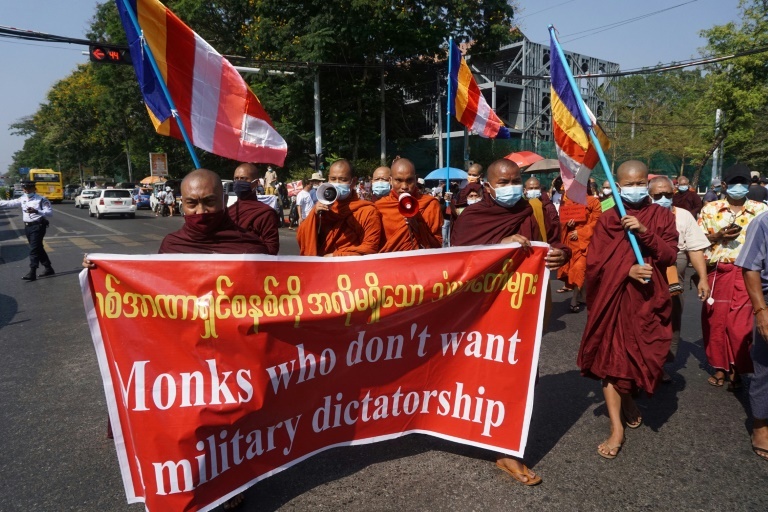
Amid ongoing military suppression in Myanmar, junta troops are reported to have shot dead a Buddhist monk and three civilians while attacking villages in Wuntho Township in the norther region of Sagaing. Local media reports indicated that the troops torched nine villages in recent days, four of which were completely razed.
“Junta troops are torching villages in Kawlin and Wuntho [townships] as they have suffered heavy casualties,” a resident of Sein Lel Village was quoted as saying “We could do nothing. We dared not go back to our village until the junta troops left, by which time our houses had been reduced to ashes.” (The Irrawaddy)
About 30,000 people from more than 40 villages in Kawlin and Wuntho townships have been displaced by fighting between Myanmar’s military and resistance groups in April, The Irrawaddy news website reported. It added that on Saturday, 80 junta troops had arrived near Sein Lel Village, where they fought against local resistance groups. Five junta soldiers were reported to have been killed. The soldiers then attacked several villages in the area.
“We clashed with junta troops near Sein Lel Village early Saturday morning. They then shelled and raided villages and torched houses. Villagers have fled the raids. A female villager died in one of the fires,” a resistance fighter was quoted a saying. “Another woman was shot dead in Thabyay Thar Village, and the abbot of the village monastery who told the junta soldiers not to torch houses was also gunned down.” (The Irrawaddy)
The soldiers reportedly abducted four people from three villages as human shields. The villagers were still in junta detention as of 26 April.
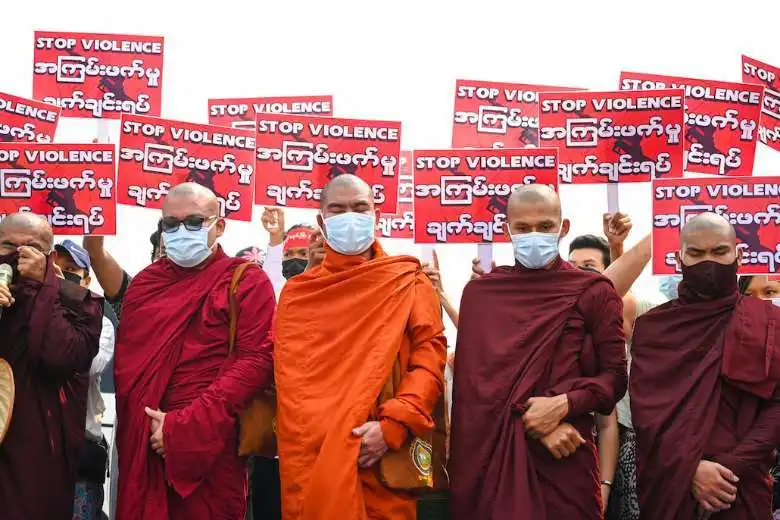
The junta—the military-led State Administrative Council—has consolidated its hold on power in the wake of the coup in February last year with violent crackdowns on public dissent and street demonstrations, which have continued in defiance of the military-led suppression. Even the country’s venerated monastic sangha have found themselves in the military’s crosshairs.*
Despite more than a year of violent suppression, the junta continues to face widespread opposition to its rule. Crackdowns on peaceful protest movements and a civil disobedience movement (CDM) have resulted in a rise in communities turning to armed resistance, often with support from existing ethnic militia groups.
Junta forces have razed at least 6,158 civilian homes since the beginning of the coup, the independent research group Data for Myanmar reported in March. The military is also accused of arbitrary killings, using civilians as human shields, and looting and burning homes and religious buildings.
A separate report by the US-based news service RFA indicated that 39 Buddhist monastics have been killed and 40 more imprisoned since the military seized power last year. Between the 1 February 2021 coup and mid-April 2022, 38 Buddhist monks and one Buddhist nun were killed, RFA reported, citing data from junta press releases, local media reports, and interviews.
“National politics doesn’t call for monks to be involved in an armed struggle,” Ashin Rajadhamma, a member of the Sangha Union in Mandalay, was quoted as saying. “Historically, the involvement of the monks [in politics] was nonviolent. We stand by doing the right thing. That’s why we express our wishes in a non-violent way. We take part in peaceful street protests. That’s how monks should be involved in national politics.” (RFA)
15 months after the coup, #Myanmar's CDM is starting to lose steam, as the junta has stepped up arrests and violence. NUG has earmarked funds to support the CDM strikers, but coercion has taken its toll; an estimated 1/3rd of 360k members have left. https://t.co/oj48equOEm
— Zachary Abuza (@ZachAbuza) April 27, 2022
Buddhist monastics are highly influential in Myanmar (formerly Burma), a predominantly Theravada Buddhist country. Monks stood at the forefront of pro-democracy protests against the previous military junta in 2007, a movement known as the Saffron Revolution that helped to bolster grassroots support among the general population. Buddhist monks in Myanmar are estimated to number in excess of 500,000, mainly centered in and around the cities of Yangon and Mandalay, along with some 75,000 Buddhist nuns.**
About 89.8 per cent of the population of this Southeast Asian nation identify as Buddhists, predominantly followers of the Theravada tradition, according to census data for 2016. Christians make up 6.3 per cent, Muslims 2.3 per cent, and Hindus 0.5 per cent, with tribal and other religions comprising 1 per cent. Groups representing all religious communities—including monastics and clergy—have taken to the streets and demonstrated against the military takeover.
Myanmar’s military declared a year-long state of emergency on 1 February 2021, after detaining President Win Myint, State Counselor Aung San Suu Kyi, and other members of the governing National League for Democracy (NLD) party. The coup d’état took place just hours before the country’s new parliament was due to convene following a general election in November 2020, during which the NLD made substantial electoral gains.
The military, which had backed the parliamentary opposition in the national election, asserted that it staged the coup in response to electoral fraud, however the national election commission said that there was no evidence to support these claims. The NLD won around 80 per cent of the available parliamentary seats in the 2020 vote.
Earlier on Wednesday, a court in the capital Naypyitaw sentenced 76-year-old Aung San Suu Kyi to five years in prison for corruption, based on charges that she accepted a bribe of US$600,000 in cash and gold bars. Observers say the conviction is the first of a series of 11 criminal cases targeting Suu Kyi that could leave the Nobel Peace Prize laureate facing combined maximum jail terms of nearly 190 years.
Factbox-Legal cases against Myanmar's Aung San Suu Kyi https://t.co/feCLrRsspX
— Dr. Htun Aung Phyo (@DrHtunAungPhyo1) April 27, 2022
In response to the ongoing crisis in Myanmar, the International Network of Engaged Buddhists (INEB) and the Clear View Project in Berkley, California, has launched an international appeal, calling for urgent humanitarian relief for Buddhist monks and nuns living in the shadow of the junta.***
“The International Network of Engaged Buddhists and the US-based Clear View Project are coordinating an urgent appeal to raise funds to support the humanitarian emergency in Myanmar that focuses on Buddhist monks and nuns,” INEB said in a message shared with BDG. “[In February 2021] the Myanmar military staged what they considered would be a ‘quick coup’ in which democratically elected members of government, including President U Win Myint and State Counsellor Daw Aung San Suu Kyi, were detained. Since that time, the country has been in turmoil with the people responding by taking a civil disobedience movement to cities and villages across Myanmar.”
The Myanmar- and Thailand-based human rights organization Assistance Association for Political Prisoners (AAPP) reported that as of 26 April, 1,798 people were confirmed to have been killed by the military junta. The organization noted that the figure represented only deaths that the AAPP could independently verify and that the actual number was likely to be much higher. A total of 10,354 people are known to be in detention, with 1,029 sentenced to prison terms and 100 sentenced to death—some in absentia, the AAPP said.
* Buddhist Monastics Targeted in Ongoing Crackdown by Myanmar’s Military Junta (BDG), Myanmar Junta Drops Plan to Place Buddhist Monks on Military Roadblocks (BDG)
** 80-Year-Old Monk Becomes a Symbol of Hope for Myanmar Buddhists (BDG)
*** INEB, Clear View Project Launch Humanitarian Appeal for Buddhist Monastics in Myanmar (BDG)
See more
Regime Soldiers Torch Nine Villages and Kill Monk in Upper Myanmar (The Irrawaddy)
Monk shot dead trying to stop soldiers burning village in Sagaing’s Wuntho Township (Mizzima)
Myanmar junta court convicts Suu Kyi of corruption: spokesman (Mizzima)
Nearly 40 Buddhist clergy killed and 40 jailed since Myanmar coup (RFA)
Myanmar’s Suu Kyi handed five-year jail term for graft (Reuters)
Daily Briefing in Relation to the Military Coup (Assistance Association for Political Prisoners)
URGENT APPEAL for Humanitarian Relief to support Buddhist Monks and Nuns in Myanmar’s Political Movement Against Military Dictatorship (International Network of Engaged Buddhists)
Related news reports from BDG
Myanmar Junta Has Destroyed Over 100 Buddhist Monasteries, Christian Churches – Report
Hundreds of Buddhist Monks Flee Temples in Eastern Myanmar as Violence Escalates
Religious Leaders in Myanmar Decry Persecution by Military Junta
Burmese Human Rights Lawyer U Nay Min Dies of COVID-19, Aged 75
UPDATE: Socially Engaged Buddhist Groups Deliver Medical Relief to Pro-democracy Protestors in Myanmar
Pro-democracy Protesters Hold Silent Strikes During Myanmar’s Buddhist New Year Holiday
INEB, Clear View Project Launch Humanitarian Appeal for Buddhist Monastics in Myanmar
UPDATE: INEB Calls for Reconciliation in Myanmar as Pro-democracy Protests Turn Violent
Peace Sangha Union Issues Statement on Myanmar Coup as Buddhist Monks Join Pro-democracy Protests
Related features from BDG
Myanmar: A Month into the Coup
The Other Shoe Drops: Reflections on Myanmar’s Latest Coup
A Reflection on the Intellectual and Socio-Cultural History of Buddhism in Myanmar
Sea of Suffering: The Rohingya and the Conundrum of Buddhist Terror
Buddhistdoor View: Reconciling Nationalism and Buddhism










